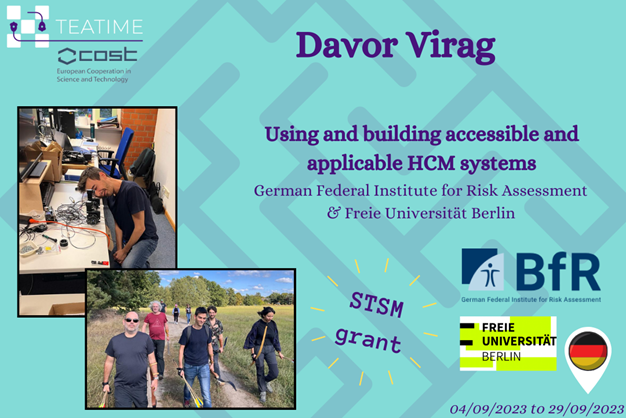
Details of the STSM
Title: Using and building accessible and applicable HCM systems
Start and end date: 04/09/2023 to 29/09/2023
Host: German Federal Institute for Risk Assessment – BfR & Freie Universität Berlin, Germany
Host website: https://www.bfr.bund.de/de/start.html
Description of the work carried out during the STSM
I have been familiarized to great extent with the modular MoPSS system and its various modes of operation, both from an electronic and programming perspective with regards to the inner workings of the device, and from an experimental perspective in terms of how and for what the device can be used. The implementation of the device in the host institution has and will immensely contribute to experimental animal welfare, increase the amount of usable data extracted from experiments, and enable the development of novel experimental paradigms with greater face and construct validity, as well as greater translational value.
MoPSS is far from the only way the host lab is striving towards better experimental standards – other methods include the ongoing development of semi-naturalistic housing modules, combining many different technologies (video, ultrasonic vocalizations, aforementioned RFID systems), careful consideration of various environmental enrichment techniques and approaches, etc. All of the above is focused on the animals’ lives in their home cages – how to allow the animals to live in as natural way as possible, to their full potential, and measure their behavior in these circumstances. The lab’s work helped me understand that these kinds of conditions are a prerequisite for examining and understanding, firstly, natural animal behaviors, and, subsequently, animal disease models, followed by possible treatments.
I have also attended meetings of the working groups of the Science of Intelligence (SoI) project (https://www.scienceofintelligence.de/), as well as the SoI fair. The project, which the hosting group is heavily involved in, combines the efforts of researchers across many disciplines (biologists, psychologists, computer scientists…) to investigate intelligence using the analytic-synthetic loop paradigm – various behaviors in different species, both at an individual and collective level, are analyzed and then reimplemented in robotic systems. The process of reimplementation offers greater insights into the adaptive, naturally evolved rules governing the examined processes.
My entire stay was underpinned by continuous in-depth discussions with members of the lab about all facets of my experiences there, as well as my previous experiences, experiments, and data acquired in my home lab. In the face of the difficulties and inherent unpredictability of animal research, each of the lab members deeply cares about answering the research question at hand thoroughly, considering all aspects of the problem, and animal welfare foremost. I couldn’t have gained a fraction of what I have without the many hours that all of the lab members invested into deep and intense discussions, that are obviously a common practice in the lab, which was one of the most inspiring things to witness and be a part of.
All of the above greatly expanded and informed my perspective, particularly as a young researcher 2 years into my PhD, which I began as a medical doctor with a limited, thoroughly anthropocentric perspective. In truth, I was taken aback by the growth that this STSM induced (both in a professional and personal way), and it will certainly continue to shape me and my career for many years to come.